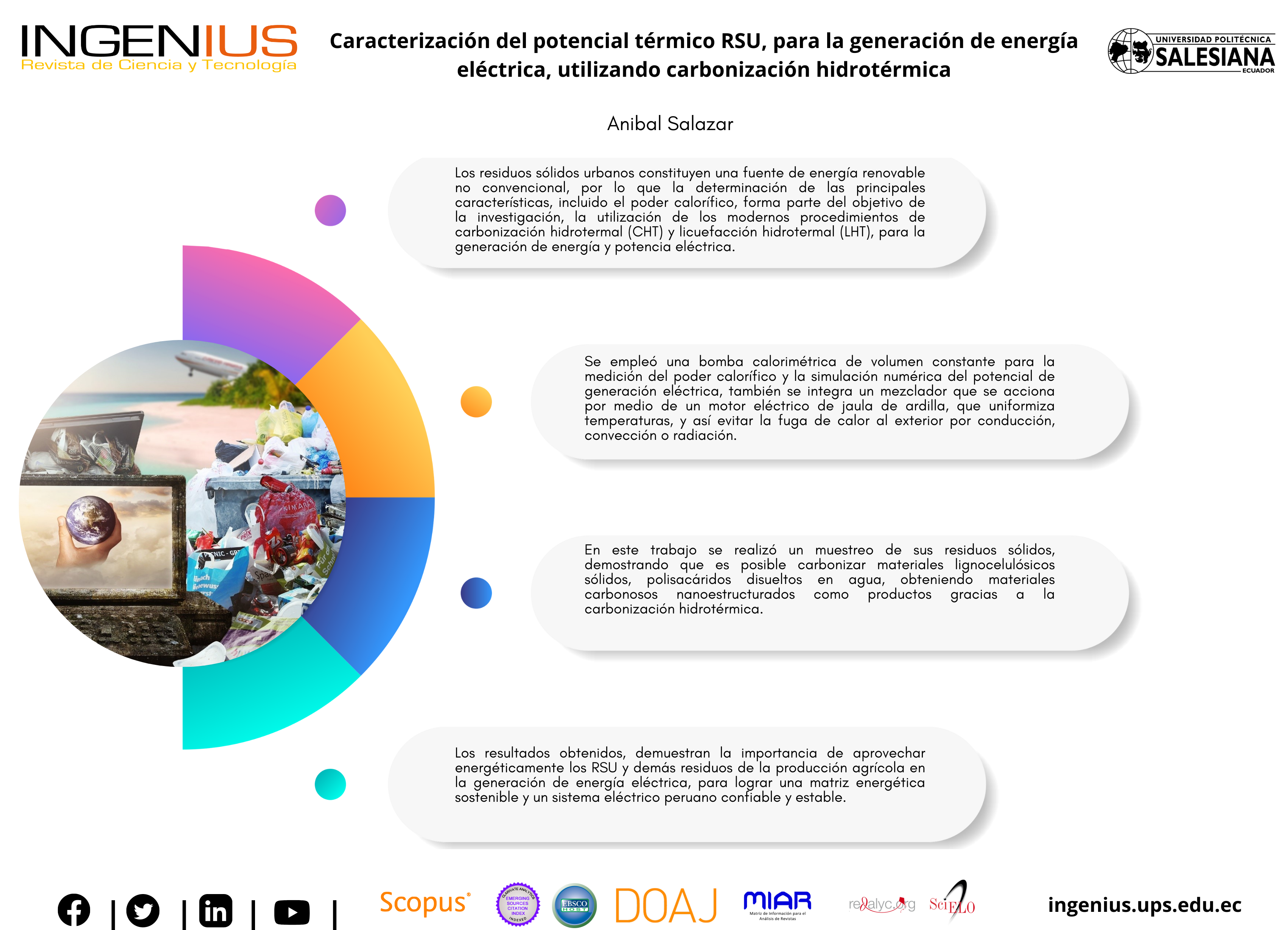Characterization of the RSU thermal potential, for the generation of Electric Energy, using Hydrothermal carbonization
Main Article Content
Abstract
Article Details

This work is licensed under a Creative Commons Attribution-NonCommercial-ShareAlike 4.0 International License.
The Universidad Politécnica Salesiana of Ecuador preserves the copyrights of the published works and will favor the reuse of the works. The works are published in the electronic edition of the journal under a Creative Commons Attribution/Noncommercial-No Derivative Works 4.0 Ecuador license: they can be copied, used, disseminated, transmitted and publicly displayed.
The undersigned author partially transfers the copyrights of this work to the Universidad Politécnica Salesiana of Ecuador for printed editions.
It is also stated that they have respected the ethical principles of research and are free from any conflict of interest. The author(s) certify that this work has not been published, nor is it under consideration for publication in any other journal or editorial work.
The author (s) are responsible for their content and have contributed to the conception, design and completion of the work, analysis and interpretation of data, and to have participated in the writing of the text and its revisions, as well as in the approval of the version which is finally referred to as an attachment.
References
G. Garrote, H. Domínguez, and J. C. Parajó, “Hydrothermal processing of lignocellulosic materials,” Holz als Roh- und Werkstoff, vol. 57, no. 3, pp. 191–202, 1999. [Online]. Available: https://doi.org/10.1007/s001070050039
BBC. (2018) Los 10 países que más y menos basura generan en América Latina (y cómo se sitúan a nivel mundial). [Online]. Available: https://bbc.in/2NyglZo
M. J. Antal and M. Gronli, “The art, science, and technology of charcoal production,” Industrial & Engineering Chemistry Research, vol. 42, no. 8, pp. 1619–1640, 2003. [Online]. Available: https://doi.org/10.1021/ie0207919
Y. Pastor Férez, M. M. Martinez Segado, and R. Valdez Illán, Construcción de una planta de producción de biochar. Departamento de Ingeniería de Alimentos y del Equipamiento Agrícola, Área de Ingeniería Agroforestal. Universidad Politécnica de Cartagena, 2019.
WBA, Global Bioenergy Statistics 2019. World Bioenergy Association, 2019. [Online]. Available: https://bit.ly/3VnXILC
F. Bedussi, “Valutazione delle potenzialitá del biochar come componente dei substrati di coltivazione,” Ph.D. dissertation, 2015. [Online]. Available: https://bit.ly/3irUnwk
D. Mohan, C. U. J. Pittman, and P. H. Steele, “Pyrolysis of wood/biomass for bio oil: A critical review,” Energy & Fuels, vol. 20, no. 3, pp. 848–889, 2006. [Online]. Available: https://doi.org/10.1021/ef0502397
A. Brown, Bioenergy roadmap 2017. Agencia Internacional de la Energía, 2018. [Online]. Available: https://bit.ly/3FePrUu
M. C. Cueva Díaz, J. L. Rosaldo Santiago, and J. López Luna, “Evaluación de la toxicidad de los suelos mediante bioensayos con semillas,” INECC, pp. 87–105, 2018. [Online]. Available: https://bit.ly/3gLD9K7
Y. Matsumura, “Chapter 9 - hydrothermal gasification of biomass,” in Recent Advances in Thermo-Chemical Conversion of Biomass. Elsevier, pp. 251–267. [Online]. Available: https://doi.org/10.1016/B978-0-444-63289-0.00009-0
L. Yang, C. Lu, Y. Gao, Y. Lin, J. Xu, H. Xu, X. Zhang, M. Wang, Y. Zhao, C. Yu, and Y. Si, “Hydrogen-rich gas production from the gasification of biomass and hydrothermal carbonization (HTC) aqueous phase.” [Online]. Available: https://doi.org/10.1007/s13399-020-01197-9
E. P. Stambaugh, “Hydrothermal processing – an emerging technology,” Materials & Design, vol. 10, no. 4, pp. 175–185, 1989. [Online]. Available: https://doi.org/10.1016/S0261-3069(89)80003-2
D. Shoemaker, Bomba calorimétrica de mediciones. Wiley, 1996.
J. Rodríguez, Caracterización de los residuos sólidos de la ciudad de Chiclayo. Limusa, 2010.
N. Baccile, M. Antonietti, and M.-M. Titirici, “One-step hydrothermal synthesis of nitrogen doped nanocarbons: Albumine directing the carbonization of glucose,” ChemSusChem, vol. 3, no. 2, pp. 246–253, 2010. [Online]. Available: https://doi.org/10.1002/cssc.200900124
T. Wang, Y. Zhai, Y. Zhu, C. Li, and G. Zeng, “A review of the hydrothermal carbonization of biomass waste for hydrochar formation: Process conditions, fundamentals, and physicochemical properties,” Renewable and Sustainable Energy Reviews, vol. 90, pp. 223–247, 2018. [Online]. Available: https://doi.org/10.1016/j.rser.2018.03.071
C. W. Garland, J. W. Nibler, and D. P. Shoemaker, Experiments in Physical Chemistry. McGraw-Hill Higher Education, 2016. [Online]. Available: https://bit.ly/3irVOen
C. Peng, Y. Zhai, Y. Zhu, B. Xu, T. Wang, C. Li, and G. Zeng, “Production of char from sewage sludge employing hydrothermal carbonization: Char properties, combustion behavior and thermal characteristics,” Fuel, vol. 176, pp. 110–118, 2016. [Online]. Available: https://doi.org/10.1016/j.fuel.2016.02.068
R. Conti, “Sintesi e caratterizzazione di carboni ottenuti dalla pirolisis di biomasse,” 2012. [Online]. Available: https://bit.ly/3GWKJMD
J. V. dos Santos, L. G. Fregolente, M. J. Laranja, A. B. Moreira, O. P. Ferreira, and M. C. Bisinoti, “Hydrothermal carbonization of sugarcane industry by-products and process water reuse: structural, morphological, and fuel properties of hydrochars,” Biomass Conversion and Biorefinery, vol. 12, no. 1, pp. 153–161, 2022. [Online]. Available: https://doi.org/10.1007/s13399-021-01476-z
S. Mazumder, P. Saha, K. McGaughy, A. Saba, and M. T. Reza, “Technoeconomic analysis of co-hydrothermal carbonization of coal waste and food waste,” Biomass Conversion and Biorefinery, vol. 12, no. 1, pp. 39–49, 2022. [Online]. Available: https://doi.org/10.1007/s13399-020-00817-8
Z. Liu and R. Balasubramanian, “Hydrothermal carbonization of waste biomass for energy generation,” Procedia Environmental Sciences, vol. 16, pp. 159–166, 2012. [Online]. Available: https://doi.org/10.1016/j.proenv.2012.10.022
E. Trujillo, C. E. Valencia A., M. C. Alegría-A, Alejandrina, and M. F. Césare-C., “Producción y caracterización química de biochar a partir de residuos orgánicos avícolas,” Revista de la Sociedad Química del Perú, vol. 85, pp. 489–504, 2019. [Online]. Available: http://dx.doi.org/10.37761/rsqp.v85i4.262

